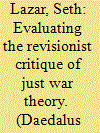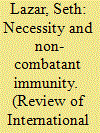| Srl | Item |
| 1 |
ID:
151764


|
|
|
|
|
| Summary/Abstract |
Modern analytical just war theory starts with Michael Walzer's defense of key tenets of the laws of war in his Just and Unjust Wars. Walzer advocates noncombatant immunity, proportionality, and combatant equality: combatants in war must target only combatants; unintentional harms that they inflict on noncombatants must be proportionate to the military objective secured; and combatants who abide by these principles fight permissibly, regardless of their aims. In recent years, the revisionist school of just war theory, led by Jeff McMahan, has radically undermined Walzer's defense of these principles. This essay situates Walzer's and the revisionists’ arguments, before illustrating the disturbing vision of the morality of war that results from revisionist premises. It concludes by showing how broadly Walzerian conclusions can be defended using more reliable foundations.
|
|
|
|
|
|
|
|
|
|
|
|
|
|
|
|
| 2 |
ID:
131697


|
|
|
|
|
| Publication |
2014.
|
| Summary/Abstract |
The principle of non-combatant immunity protects non-combatants against intentional attacks in war. It is the most widely endorsed and deeply held moral constraint on the conduct of war. And yet it is difficult to justify. Recent developments in just war theory have undermined the canonical argument in its favour - Michael Walzer's, in Just and Unjust Wars. Some now deny that non-combatant immunity has principled foundations, arguing instead that it is entirely explained by a different principle: that of necessity. In war, as in ordinary life, harms to others can be justified only if they are necessary. Attacking non-combatants, the argument goes, is never necessary, so never justified. Although often repeated, this argument has never been explored in depth. In this article, I evaluate the necessity-based argument for non-combatant immunity, drawing together theoretical analysis and empirical research on anti-civilian tactics in interstate warfare, counterinsurgency, and terrorism.
|
|
|
|
|
|
|
|
|
|
|
|
|
|
|
|